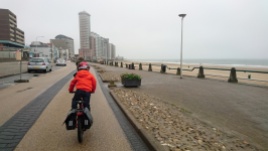In the first week of this year’s Netherlands trip, we decided to stay in Vlissingen, Zeeland. This was our first time in Zeeland, we’ve mainly stayed around North and South Holland in previous trips.
Zeeland is located in the south west of The Netherlands and is made up of a number of islands, with large parts below sea level. The province fell victim to a great flood in 1953, and the Dutch have since developed an impressive array of sea defences, known as the Delta Works.
Vlissingen itself is a small city situated on the former island of Walcheren. It has a long history going back to 620 AD and its growth is very much tied to the sea, shipping and war. Much of the city was rebuilt after it was heavily damaged by shelling in the Second World War.
We were staying in an Airbnb apartment, not far from the beach and were lucky to have a bit of sea view. I spent many a free moment watching ships on their way to and from Antwerp as they passed.
The apartment was a bit away from the centre of town and shops, so it meant using bikes for most trips. Something I was more than happy to do. There was secure bike storage at the apartment that came in useful, we definitely need to see more of this in the UK.

As a city, I’d say Vlissingen is some way behind the best Dutch examples when it comes to cycle provision. Many streets have no provision or poor quality provision (paint on road). There are plenty of examples of good quality segregated infrastructure, but on a typical ride, it’s necessary to mix between the good and the bad.

Some of the poorer examples are close to the centre of the city, near the shopping areas. These areas have some of the busiest roads, so you’re forced to share the roads with a lot of motor traffic, dodging parked cars, buses and trucks. With kids in tow, it makes the whole experience quite unpleasant.

Another poor example is the road running along the seafront. This is designated a fietsstraat (bicycle street), so in theory, motor traffic should be guests and most of the traffic should be bikes. Unfortunately, the road is a through route, so levels of motor traffic usage are much higher than they should be. Riding down the street, you are continualy overtaken, which isn’t great on quite a narrow road with a central divider.

Some of the best places to ride in the area are actually away from the roads, along the beaches and along the canal to Middelburg. Here, you get to get to ride traffic-free, in a very pleasant setting.

During our time in Vlissingen, the weather wasn’t brilliant. So we spent a reasonable amount of time doing indoor activities, such as visiting the Zeeuws maritiem muZEEum and Blokje Bij Blokje.
It would be nice to be there again in better weather, to fully appreciate the area. Although it may not be the best in The Netherlands for cycling, it’s still a great place to stay for a break with the bikes.
Back to part 1 – Dutch bikes
Next to part 3 – The route to Middelburg












































